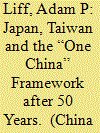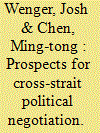| Srl | Item |
| 1 |
ID:
189499


|
|
|
|
|
| Summary/Abstract |
This study analyses the “one China” framework's significance for Japan–Taiwan relations since Tokyo switched diplomatic recognition from Taipei to Beijing in 1972. Drawing on Chinese-, Japanese- and English-language sources, it examines developments since the breakthrough Japan–PRC normalization communiqué and the “Japan formula,” which enabled Tokyo to normalize relations – six years before Washington – without recognizing Beijing's claim of sovereignty over Taiwan, and while maintaining robust, if unofficial, ties with Taipei thenceforth. Highlighting distinctions between Beijing's self-asserted “one-China principle” and Japan's ambiguous official position and subsequent effective policies, it assesses incremental but practically significant evolutions of Japan–Taiwan relations over the past half-century. In the 21st century, the trend towards incrementally closer ties has proven strikingly resilient to political transitions in Japan and Taiwan, China's growing power, pushback from Beijing and worsening cross-Strait frictions. Beyond Japan–Taiwan relations and theoretical debates on “one China,” this article's findings carry significant implications for Taiwan's international space, cross-Strait dynamics and China–Japan–United States relations.
|
|
|
|
|
|
|
|
|
|
|
|
|
|
|
|
| 2 |
ID:
156604


|
|
|
|
|
| Summary/Abstract |
This study adopts a pre-negotiation approach based on Robert Putnam's win-set concept to examine domestic constraints on cross-Strait political negotiation. Survey research of elite opinion in both China and Taiwan and of public opinion in Taiwan is used to estimate each side's win-set (that is, the set of political negotiation outcomes that could win majority approval domestically) during Ma Ying-jeou's second presidential term in Taiwan (2012–2016). The possibility for overlap in win-sets that could provide a zone of possible agreement and the potential for coalitions in favour of negotiation are analysed. The study finds no win-set overlap and limited potential for coalitions favouring negotiation outcomes with the least distance from overlap, concluding that domestic conditions for formal political negotiations between Beijing and Taipei are unlikely to be ripe in the near term.
|
|
|
|
|
|
|
|
|
|
|
|
|
|
|
|
| 3 |
ID:
152983


|
|
|
|
|
| Summary/Abstract |
To repress growing regional/national identity in Taiwan, China applies rationalist strategies, including economic incentives and military threats. Analysis of the Taiwan National Security Survey in 2003–2015 shows that China’s carrot and stick policies negatively correlate with exclusive Taiwanese identity. In younger generations, perception of the strength of the policies is similar, but their effect on identity is weaker.
|
|
|
|
|
|
|
|
|
|
|
|
|
|
|
|